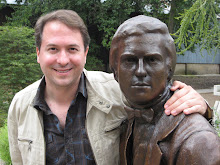Day Three
Wednesday morning, July 8th
Continuing right after Dan Dennett's talk was one more main speaker, Oxford Professor John Hedley Brooke, President of the International Society for Science and Religion. His lecture was Darwinism and the Survival of Religion, dealing mainly with the History of Science and Religion in Victorian England. He began with a cute story of a sign on the front of a church in Jerusalem: "No Explanations in the Church". What this actually meant was tour guides were requested to be quiet when in the church, but he used it as a funny way of discussing the benefits of religion other than trying to explain the same things that science does.
Without a doubt the best quote of the talk was "Describing religion as a failed attempt to explain life is like calling ballet a botched attempt to run for the bus". Over all Prof. Brooke believes that nature leaves room for supernatural interpretation (which was in marked contrast to Dennett's air-guitar comment).
Next up were three panellists with shorter talks. Philip Kitcher, a Philosopher of Science from Columbia University, spoke on Religion and Human Nature: What Does Darwin Teach Us? In attempting to understand life as a series of historical processes, Prof. Kitcher suggested that perhaps religion originally began as an "Ethical Project", where an early human tribe decided on a set of useful rules that could assist "human compliance in the norms of a group". To my ear, he seemed to be suggesting that human behaviour was all "culture", and thus there was no need for a "biological explanation". Hmmm...
Robert Richards is from the University of Chicago (you could tell from his black t-shirt, black leather jacket and very thick midwestern accent) where he is a Professor in the Departments of History, Philosophy and Psychology. He threw out a wall of rapid words that mostly flew right over my head. There was something about "adopting the language of final causality" and a "moral sense that can be an advantage to the bearer", but that's as much as I was able to capture. In my notes I wrote "lots of words, not sure the meaning of most".
Steve Jones, Professor of Genetics and head of the Biology Department at University College London, was a familiar name to me because I really enjoyed his book Darwin's Ghost: The Origin of Species Updated (also known as Almost Like a Whale). Prof. Jones was quite witty and tossed off many seemingly practiced bon mots. My favorite was when he was asked to speak at Saint Paul's Cathedral on the subject of "Why are we here?" and began with "I don't know why we are here, but I know why I am here - you couldn't get Richard Dawkins". I was rather disappointed with his talk since he mostly trashed sociobiology, saying that only in the most general terms can evolution be useful in explaining culture. He also felt that evolution was bad at explaining how we became human since all of the traits that define us are unique. I guess he's not too up on comparative primatology and doesn't know any good cultural or physical anthropologists.
Given that most of these speakers were either pro-religion or anti-sociobiology/memetics, it seemed like a bit of a set up against Dan Dennett. This became painfully obvious when Professor of Divinity, Sarah Coakley, the chair (and presumably organizer) of the session, kept making snide little asides to Dennett: "Meme's might be all made up" and later "You can't see memes either". So much for impartiality of a moderator.
The best thing to come out of the session (besides of course Dan Dennett's much applauded, rousing talk) was when during the Q&A the panel was asked why biology seems so obsessed with Charles Darwin. Steve Jones put it beautifully when he said that the science was worth obsessing over for it's own sake, but Darwin is worth praising for being such "a nice scientist" which is rather rare, but also for being the best biologist to have lived.
Thursday, July 16, 2009
Subscribe to:
Post Comments (Atom)


I like that Prof. Brooke believes that nature leaves room for supernatural interpretation. I don't think that to be a real scientist you have to ignore that kind of stuff. I think experiencing things that are so beautiful that they inspire a supernatural interpretation, or at least a sublime appreciation for the bigger picture, is part of what keeps me engaged and yearning to learn more about science and biology.
ReplyDelete